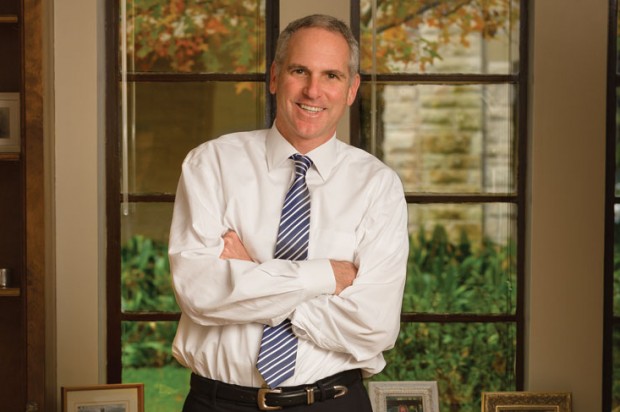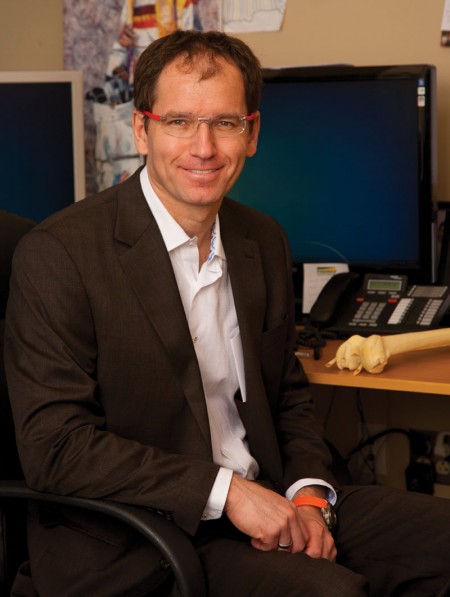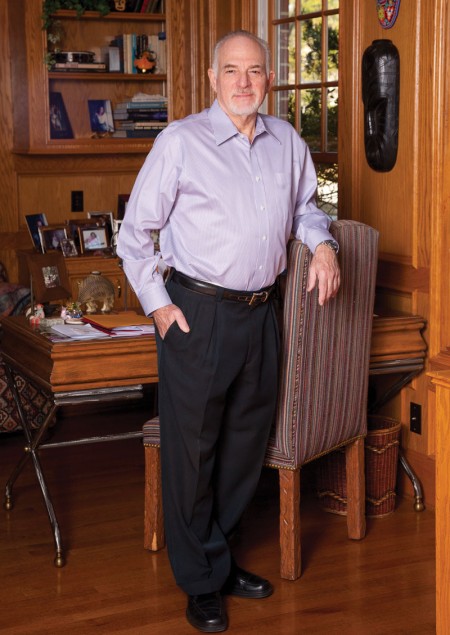Learning differences - all grown up


Mark Desjardins, who has a learning difference, completed a demanding doctorate program and became headmaster of St. John’s School. (Photo: hartphoto.com)
Mark Desjardins struggles to sign his name but has a doctorate and heads a prestigious prep school. Stefan Kreuzer has never read a book for pleasure but is a well-regarded orthopedic surgeon. Kian Adkins Chance can’t write an email without errors in it but is a successful photographer.
These adults all have learning differences. They also have successful careers and lives.
Desjardins, headmaster of St. John’s School, was diagnosed with dysgraphia, a severe difficulty with handwriting and other fine-motor and spatial tasks, as a first grader at a public school in Austin. Though his testing showed very high scores for verbal reasoning and logic, his scores for spatial abilities were low, a common profile for dysgraphia.
“If you show me a shape and ask me to draw it, that’s hard,” he says. “To this day, I have a hard time tying my shoes.”
Back in the 1970s, Desjardins was put in a slow-moving academic group. “Rather than give mainstream teachers the tools to teach kids like me back then, the schools would take these kids out of mainstream English and math classes to go to the resource room,” he says. “That would cause them to fall further behind. And the teasing … oof. It was not the way to do it. My teachers were not bad people, but the belief then was that anyone who struggled was not smart.”
The stigma persists. When Desjardins talks as a headmaster with parents about their children’s learning differences, “the first thing I say is, ‘This is not an impediment to being successful.’ The first advice I give is don’t jump to the conclusion that your child is lazy.”
Desjardins’ parents did not. “I was a middle child. My parents knew, compared to my brother and sister, that something wasn’t right,” he says. At the end of his sophomore year of high school, his parents made the decision to send him to a boarding school in Massachusetts that specialized in students with learning differences, Cushing Academy.
Such parental understanding is key. Kyle Lehne, a Houston businessman, struggled academically. Then his mom died of cancer while he was in high school. He wondered whether to even try college. Then he found a letter from his mother. “She wrote that even though my sister had made all As and I struggled in school, she believed I had all the intellectual power I would ever need to be successful,” he says. His mom enclosed an article about a successful local businessman, which mentioned that the man had been a poor student.
Today, Lehne, a college graduate, and his wife, Kathy Lehne, run their own fuel and lubricant wholesale business, Sun Coast Resources. As director of the company’s emergency response, Kyle recently spent weeks in New York City, arranging the delivery of fuel to clients in the aftermath of Hurricane Sandy.
“There are personalities for certain jobs,” says Lehne, who believes he has both dyslexia and attention deficit disorder (ADD) but has never been diagnosed. In addition to emergency response, he is also in charge of Sun Coast’s sales and marketing team. “Analyzing reports in an office, while I can do it, drives me crazy,” he says. “Being out and on the phone, selling, that’s the fun stuff.” His advice to people with learning differences is to find something they enjoy and work hard at it.

Stefan Kreuzer has travelled the world, teaching other orthopedic surgeons new and better joint-replacement techniques. (Photo: lawellphoto.com)
Likewise, when Kreuzer, the dyslexic orthopedic surgeon, gives advice to kids, he tells them “to find their mojo.” As is typical with learning differences, on tests, Kreuzer’s abilities are scattered. On the MCAT, the standardized test used for admission to medical schools, Kreuzer’s math abilities were exceptional, but “I can remember vividly not getting past about 60 or 65 percent of the reading portion” before time was up, he says.
Kreuzer had to work hard in medical school. “I studied for 12, 14, 16 hours a day,” he says, “but I ended up graduating just barely in the top half of my class.” Classes that depended heavily on memorization, he explains, “were torture,” but when he got to gross anatomy, where students dissect a human body, “I immediately knew every body part, its name, its functions.”
Research has shown that while dyslexics have a hard time with reading and memorization, they typically have stronger than average spatial and visual abilities. Orthopedic surgery is “perfect for me,” says Kreuzer, who, in addition to his private practice, is actively involved in orthopedic research and design.
Also dyslexic, business owner Lance Thompson says, “I have to read things over and over,” and when he listens to a lecture, “it sounds garbled to me.” School was tough. “But I always knew I was smart because of what I could do outside of school,” he says. By age 10, neighbors were paying him to landscape their yards. By the time he was at Lamar High School, he had founded his company, Thompson & Hanson, which currently employs 260 people in the landscape-architecture business, nurseries, retail stores and, most recently, restaurants, with offices in both Houston and Austin.
Adkins Chance, who is also dyslexic, started working for a photographer while she was in the ninth grade at Briarwood, a Houston school that specializes in children with learning differences and developmental disabilities. “You need to have confidence to ask for help,” she says. “I tell kids the smartest person in the class is the one who is asking questions. And you know what? That there is a kid willing to ask questions is probably helping other kids in that class.”
Adkins Chance credits the Briarwood School with giving her confidence and self-advocacy skills. In college, “I had the ability to go up to a teacher and talk about what I needed, like untimed tests,” she says. “Sure, some huffed and puffed a little, but I didn’t care. I had confidence in myself.”
Adkins Chance opened her own photography studio less than a year after graduating from photography school. Though she specializes in family portraits, she has done a range of photography work and counts Bob McNair, owner of the Texans, George H.W. Bush, Rudy Giuliani and ZZ Top among her subjects.

Jay Tarnow, a psychiatrist who also has ADHD, focuses on strengths as well as struggles when working with patients who have these issues. (Photo: lawellphoto.com)
Jay Tarnow, a psychiatrist who has attention-deficit with hyperactivity disorder (ADHD), works with people with learning differences at the Tarnow Center for Self-Management. He says one of the biggest indicators of his patients’ future success is confidence. “That’s why I am so concerned with how these children are treated in school,” he says. “An [uniformed] teacher can destroy someone.”
On the other hand, when teachers know how to teach to someone with a learning difference, it means they know multiple ways to teach the material and can choose the approach that works for the child in front of them. “The concept that you teach to the child’s style and not to your own helps all the children in a class,” Tarnow says.
Daniel Radcliffe, the actor who played Harry Potter, dyspraxia (a more general form of dysgraphia)
John Irving, author, dyslexia
Wendy Wasserstein, playwright, dyslexia
Nolan Ryan, major league pitcher, dyslexia
Richard Branson, founder of Virgin Airlines, dyslexia
Paul Orfalea, founder of Kinko’s, dyslexia and ADD
Charles Schwab, founder of Charles Schwab Corp., one of the first companies to offer discount, online brokerage, dyslexia
John Chambers, CEO of Cisco, dyslexia
Whoopi Goldberg, entertainer, dyslexia
Dan P. Malloy, governor of Connecticut, dyslexia
Gaston Caperton, two-term governor of West Virginia, dyslexia
Carol W. Greider, Nobel Prize-winning scientist, dyslexia
Dav Pilkey, author of children’s books including the Captain Underpants series, dyslexia and ADHD
Michael Phelps, Olympic swimmer, ADHD
Orlando Bloom, movie actor, dyslexia
Ann Bancroft, polar explorer, dyslexia
Tarnow didn’t learn to read until the third grade. “It traumatized me so much,” he remembers. “I felt stupid.” Teachers took him into the coat room to give him extra help. As an adult, he realizes they probably didn’t have any other space and, also, that they were using an approach, teaching phonics, that just wasn’t going to work for him. “But as a kid, I didn’t realize any of that. I just felt embarrassed and ashamed,” he says. “In hindsight, it’s kind of hilarious: I was literally in the closet.”
Like dysgraphia and dyslexia, attention deficit can confer strengths as well as weaknesses. “In my opinion, people with ADHD have skills that normal people do not, like more energy,” says the 65-year-old Tarnow. “Until a few years ago, I used to work 16 hours a day. Now, I only work 12.”
And while it’s common to believe that people with attention deficit can’t focus at all, “the truth is, while we have a hard time focusing when the material doesn’t interest us, when we are interested, we hyper-focus,” says Tarnow, “meaning we focus better than typical people.”
In hindsight, St. John’s headmaster Desjardins says he sees his learning difference as a gift, though it didn’t seem like one when he was a child. “Because you have to struggle, you develop resilience and a healthier appreciation and understanding of other people’s struggles,” he says.
“I tell these kids that elementary, middle, high school, will be the hardest thing they ever do. After that, you can focus on your giftedness.”
Says Lehne, “We insist on putting everyone into the same box. But we’re all different and there’s room for all of us.”
Editor’s note: Writer Cheryl Ursin is the parent of two children. One has dyslexia, the other dysgraphia.
Want more buzz like this? Sign up for our Morning Buzz emails.
To leave a comment, please log in or create an account with The Buzz Magazines, Disqus, Facebook, or Twitter. Or you may post as a guest.


